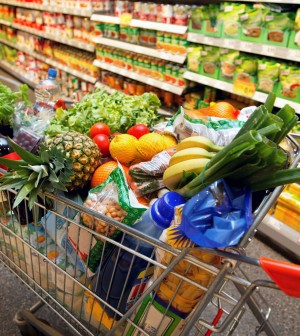- Could Your Grocery Store Meat Be Causing Recurring UTIs?
- Are You Making This Expensive Thermostat Error This Winter?
- Recognizing the Signs of Hypothyroidism
- 10 Strategies to Overcome Insomnia
- Could Artificial Sweeteners Be Aging the Brain Faster?
- Techniques for Soothing Your Nervous System
- Does the Water in Your House Smell Funny? Here’s Why
- Can a Daily Dose of Apple Cider Vinegar Actually Aid Weight Loss?
- 6 Health Beverages That Can Actually Spike Your Blood Sugar
- Treatment Options for Social Anxiety Disorder
Despite Resolutions, Food Bills Go Up After New Year’s

So New Year’s Day has come and gone, leaving millions with resolutions to finally shed some pounds.
However, a new study finds that Americans actually buy more food and more total calories during the days after the holiday season than they do during the holidays.
A team led by Lizzy Pope of the University of Vermont tracked grocery spending for 200 households in New York State. They looked at three periods: “pre-holiday,” from July to Thanksgiving; “holiday,” from Thanksgiving to New Year’s Day; and “post-holiday,” from January through March.
The investigators found that compared with pre-Thanksgiving habits, food spending shoots up by 15 percent during the holiday season, with most of the extra calories entering the home in the form of junk food.
That’s not so surprising. But the study also found that the overeating continued after January 1. Get-slim resolutions notwithstanding, food purchases continued to rise after New Year’s Day, jumping another 9 percent over holiday purchasing expenditures during the first two months of the new year.
“People start the new year with good intentions to eat better,” Pope, of the university’s department of nutrition and food science, noted in a University of Vermont news release.
“They do pick out more healthy items, but they also keep buying higher levels of less-healthy holiday favorites. So their grocery baskets contain more calories than any other time of year we tracked,” Pope said.
Study co-author Drew Hanks, of Ohio State University, added, “Based on these findings, we recommend that instead of just adding healthy foods to your cart, people substitute less-healthy foods for fresh produce and other nutrient-rich foods.” Hanks worked on the study as a post-doctoral researcher at Cornell University.
“The calories will add up slower, and you’ll be more likely to meet your resolutions and shed those unwanted pounds,” Hanks suggested in the news release.
The study findings were published recently in the journal PLOS ONE.
More information
There’s more on healthy food shopping at the U.S. Department of Health and Human Services.
Source: HealthDay
Copyright © 2026 HealthDay. All rights reserved.










